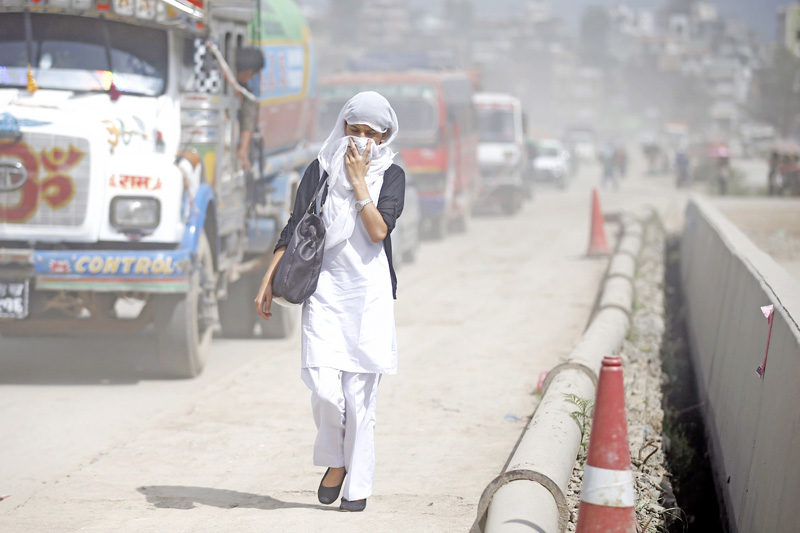Unabating air pollution in Capital endangers public health
KATHMANDU: Relentlessly increasing air pollution in Kathmandu Valley is proving to be a peril to the health of its inhabitants, calling government agencies to recognise the situation as a public health emergency.
The air quality of Kathmandu is deteriorating with each passing day and the city dwellers do not know when or whether they can expect any improvement in the quality of air they breathe. The situation is no longer just a general topic of conversation as it has started posing serious threats to the health of general public.
Major factors contributing to the risky levels of air pollution are harmful and uncontrolled emission from vehicles, increasing level of dust in the air caused by the seemingly unending road demolition-road construction cycle and Melamchi Drinking Water Project, emissions from industries, and smoke emitted from brick kilns, among others, as cited in a meeting held at the Office of the Prime Minister and Council of Ministers (OPMCM) on January 10.
This issue, however, is not an overnight or a current one. Persistent negligence on part of the state to address environmental concerns, especially as a threat to public health, has led us to this point. Partly, citizens’ apprehension to voice their concerns can also be taken as a responsible factor behind an ever-deteriorating environment of the city.
The state’s negligence is evident also in the fact that not much effort has been made in terms of scrutinising the effect of growing vehicles in the city. During auto-shows, thousands of bookings are made in advance and sales of vehicles during other times are rampant too. This is just a random instance of where the state could impose regulation in terms of controlling indiscriminate sales of vehicles. Not only does this add to an existing environmental concern, it further puts a huge question mark against the already complicated traffic management system in the city.
However, albeit late, the state has become alert and has started taking little steps to address this issue after mounting public pressure. This concern may now be confined to the capital and a few urban areas, but this will definitely expand if not brought into check.
Young activists and politicians too are taking these environmental concerns seriously, which definitely has not yet fallen in the ‘priority-list’ of most of our senior politicians.
THT Online will get back to its readers with further commentaries and suggestions of such environmental-activists and experts with more polished details in the next article, in an attempt to give continuity to the environmental-concern debate.
READ ALSO:






